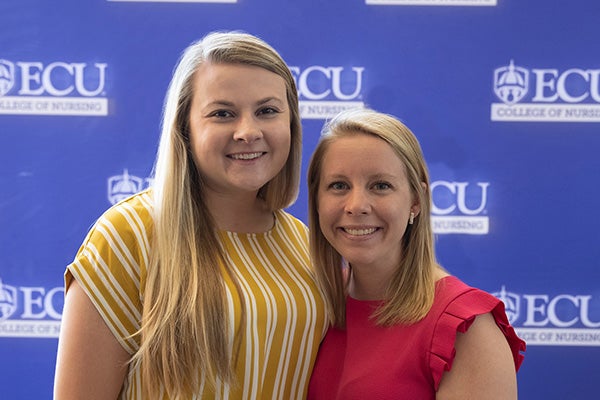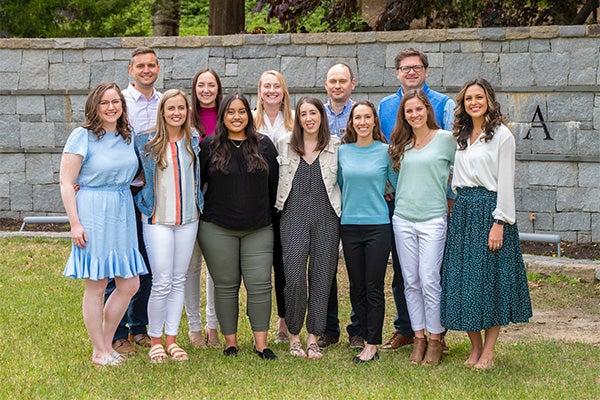First cohorts graduate from ECU’s newest nursing doctoral programs
The College of Nursing at East Carolina University prepares more new nurses for North Carolina than any other four-year institution — its faculty and leadership focus on producing nurse leaders who answer the call in areas of need across the profession.
The tangible results of that commitment will walk across the stage this week. The first cohort in the Bachelor of Science in Nursing (BSN) to Ph.D. program will celebrate graduation along with the first cohort in the Doctor of Nursing Practice (DNP) Nurse Anesthesia program. These two programs, made up of two and 12 students, respectively, mark two new ways the College of Nursing is adapting to an evolving field.
Both programs challenged students with rigorous requirements but rewarded them with engaging patient experiences, preparing them to begin new chapters in patient care, research and nurse leadership.
BSN to Ph.D. program
Taylor Nelson and Morgan Braxton earned early assurance in nursing spots in the College of Nursing’s Ph.D. program before they began their careers as undergraduates in the ECU Honors College.
Now, they are on the home stretch.

Morgan Braxton, left, and Taylor Nelson make up the first cohort in the ECU College of Nursing’s BSN to Ph.D. program. Both earned early assurance spots in the program through the Honors College. (Photo by Conley Evans)
The BSN to Ph.D. program blends the doctoral curriculum with two different Master of Science in Nursing (MSN) concentrations — the nursing education concentration or the health systems leadership concentration. This option reduces the number of master’s-level courses required in the traditional MSN program and facilitates completion of the nursing Ph.D. in a timely manner.
“This allows students who have an interest in doctoral education, with a focus on education or leadership, to engage in doctoral studies earlier than a more traditional route,” said Dr. Sylvia Brown, dean of the College of Nursing. “We are so proud of our first two graduates who are now nurse scientists and plan to continue their research and studies by beginning postdoctoral work.”
For Nelson, of Mocksville, North Carolina, the path to a Ph.D. is one she is proud to forge for those who come after her.
“The first word that comes to mind is ‘honor,’” she said. “I am just so honored to be one of the ‘first’ graduates of this program. I highly value mentorship, and being in the first cohort of students to go through this program provided a seamless opportunity for me to build relationships with students earlier in the program and engage with them to assist them with their transitions into the Ph.D. program while juggling the responsibilities of becoming a new nurse and graduate research assistant.”
Nelson said the program has prepared her for her next steps, which include pursuing a T32 postdoctoral fellowship at the University of North Carolina at Chapel Hill School of Nursing.
“I am very proud to be a Pirate nurse,” she said, “and no matter where the road leads, Pirate Nation will always be my home.”
Braxton, originally from Greenville and currently of Fuquay-Varina, North Carolina, said the College of Nursing provided mentorship during her undergraduate years that helped prepare her for the rigor of the program.
“It was through that process I began to see what skills and opportunities the Ph.D. program could provide to me,” she said. “For my senior honors project, I worked with my mentor Dr. Kim Larson and conducted a study during my summer study abroad in Guatemala. That hands-on experience is where I really fell in love with the research. When I went on to publish that study, I really enjoyed learning the process, and began to see how I would enjoy nursing research as a career.”
Throughout the graduate program, Nelson and Braxton took a full-time course load, worked as graduate research assistants for the College of Nursing, and worked part-time as nurses.
“Each piece of the program is essential — gaining bedside experience, hands on research experience and the knowledge from course work — all allowed for me to grow in my abilities as a nurse scientist,” Braxton said. “There is a need for Ph.D. prepared nurses, both on the front of scientific development and education for future nurses. I hope that obtaining this degree early in my career will allow me more time to make a significant, positive impact on our profession and health system.”
Braxton will begin a post-doctoral fellowship program at Arizona State University this summer.
“I felt like the faculty and leadership were really encouraging, and wanted to see me, and the program in general, be a success. It’s that support that makes students really feel seen,” she said. “I’m so proud to be in the first cohort graduating from the Early Assurance BSN to Ph.D. program and look forward to seeing the others that come after us.”
DNP Nurse Anesthesia
The 12 students that make up the College of Nursing’s first cohort in the Doctor of Nursing Practice (DNP) Nurse Anesthesia program are charting the course for the next group of students as well.
The program transitioned from a master’s degree to the DNP, adapting to better suit the needs of practicing nurses.
The cohort includes Reagan Atkins, Erin Brackett, Charlotte Brown, Genesis Guzman, Adam Hobbs, Jordan Jackson, Mary-Belle Mikesell, John Purvis, Erin Stevens, Hannah Travlos, Jennifer Young, and Andrey Zorin.

The College of Nursing’s first cohort in Doctor of Nurse Practitioner Nurse Anesthesia gathered at the edge of ECU’s campus last week to mark their completion of the program. (Photo by Ty Huff)
“I am so grateful to have been a part of ECU College of Nursing’s first doctoral cohort of nurse anesthesia students,” Brown said, “and I am looking forward to leading within and growing alongside this amazing profession.”
The ECU College of Nursing nurse anesthesia program has been educating nurse anesthesia students who graduated with master’s degrees since 2005,” said Dr. Maura McAuliffe, professor and director of the nurse anesthesia program. “Since that time, graduates have been providing anesthesia care for the residents of eastern North Carolina and beyond.”
The clinical doctoral degree has mandated for entry to practice by 2025 by the Council on Accreditation of Nurse Anesthesia Educational Programs, McAuliffe said.
“These inaugural DNP nurse anesthesia students have been educated with the traditional anesthesia program components that combine an outstanding basic science curriculum with extensive clinical experience in the practice of nurse anesthesia,” she said. “They are well prepared to provide general and regional anesthesia to all types of patients and cases, but now have additional competencies required of the DNP curriculum: populations health, health care finance, statistical design and methods for translational studies and leadership working in interdisciplinary teams to care for patients across the lifespan. They have all completed a quality improvement (QI) project and understand QI processes that they can apply in a variety of clinical environments.”
The cohort is made up of BSN-prepared registered nurses with two or more years of ICU experience and were competitively selected for the program. Many were working in intensive care units when they began this 36-month full-time program in May 2019 and caring for COVID-19 patients when the pandemic ensued, McAuliffe added.
The anesthesia didactic education was delivered in an online platform for one full semester with faculty redesigning teaching methods to ensure that students received lectures and exams, while anesthesia simulation labs were accomplished in smaller groups using social distancing. When they could begin their clinical education, the students were ready to begin the clinical curriculum with the nurse anesthetists and anesthesiologists at Vidant Medical Center, where they obtain 95% of the experience they need to sit for the national certification examination to become certified registered nurse anesthetists (CRNAs).
“We are very proud of this inaugural DNP cohort who forged the way, setting a high bar for those who follow,” McAuliffe said. “Half of the graduates will begin their practice at Vidant Medical Center, joining over 200 Pirate nurse anesthesia CRNAs who are working in eastern North Carolina and other places, providing excellent anesthesia care for patients from one minute to 100 years of age in medical centers, surgicenters, dental offices and wherever anesthesia care is delivered.”
Jennifer Young, a member of the cohort, said she looks forward to caring for patients across the region and state, an opportunity she credits to ECU, the college and McAuliffe.
“It speaks mountains for the College of Nursing to offer this degree, and I am so honored to be a part of the inaugural class,” she said. “Dr. McAuliffe was fundamental in starting this and has set such a strong foundation for the program. Completing this program has provided me with the tools needed to excel in the clinical field while being able to incorporate up-to-date practices from reading and understanding new research as it emerges. Health care is constantly changing, and I feel prepared to provide the best care to my patients.”